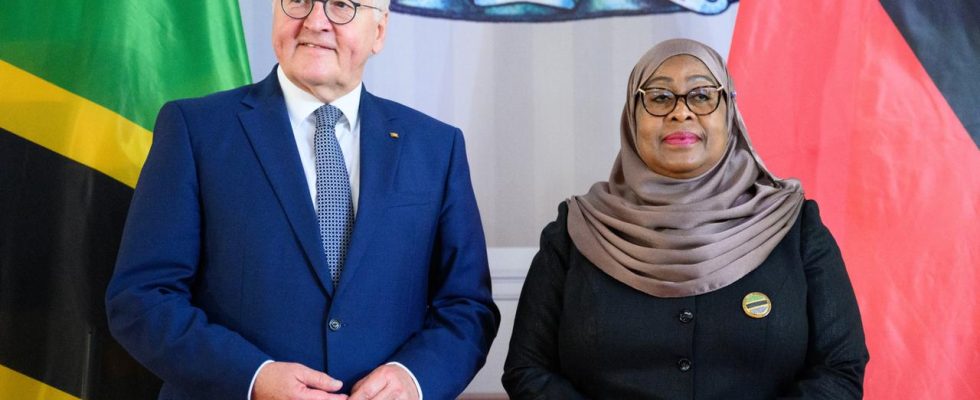Federal President Steinmeier will be the first German state representative to meet relatives of victims of German colonial rule in Tanzania. Both countries now want to come to terms with this time of exploitation and violence together.
Federal President Frank-Walter Steinmeier has spoken out in favor of coming to terms with German colonial rule in Tanzania together with the East African country. “It is important to me that we work through this dark capital, that we work through it together,” said Steinmeier at a meeting with Tanzania’s President Samia Suluhu Hassan in the port metropolis of Dar es Salaam. Hassan said Tanzania was ready to “start official negotiations to see how we can deal with the colonial legacy in our country.”
Germany is ready to cooperate, which also includes the repatriation of cultural assets and human remains. Steinmeier advocated increasing knowledge about the colonial past, especially in Germany. “Atrocities committed by the German colonial occupation” overshadowed our shared history.
atrocities during the Colonial rule
Tanzania was part of the German East African colony until the end of the First World War. Colonial rule was characterized by oppression, exploitation and atrocities. Uprisings against the Germans were brutally suppressed. According to Tanzanian estimates, up to 300,000 people were killed in the so-called Maji-Maji War between 1905 and 1907.
Many skulls and bones are still in German museums today. There are families waiting for the remains of their beloved ancestors, Hassan said.
Steinmeier meets relatives of victims
Steinmeier will be the first German state representative to meet such relatives in Songea on Wednesday. The Federal President said that this visit was “dedicated to coming to terms with the situation together”. He was “deeply grateful that some of the descendants of victims from the Maji Maji War invited me to talk.” This is “anything but a given”.
Making relationships “future-proof.”
Steinmeier will be accompanied on his trip by a business delegation. According to him, it is also about “future-proofing” relations with Tanzania. Tourism is interesting for German investors, as is agriculture.
The country also has rich mineral resources – in addition to gold, graphite, rare earths, uranium and coal. This contributes to the fact that the economic prospects are good. Experts currently estimate growth at around five percent, and the trend is rising. According to a forecast by the International Monetary Fund, Tanzania could even replace Kenya as the strongest economic power in East Africa in about ten years.
Steinmeier visited a cement company production facility near Dar es Salaam
Hassan is considered Bearer of hope
The political climate is also crucial. Hassan has only been in office for around two and a half years and is the only head of state with government power on the African continent. Steinmeier praised the path taken by Hassan to strengthen democracy and the rule of law.
From Berlin’s perspective, the 63-year-old is a bearer of hope. After the autocratic course of her predecessor John Magufuli, she chose a more liberal path. For example, the ban on demonstrations that had been in place for years was lifted.
However, human rights organizations such as Amnesty International criticize that there are still significant deficits in areas such as freedom of the press and freedom of assembly – something that is seen in a similar way in Berlin.
Tanzania is about two and a half times larger than Germany, but with around 65 million inhabitants, it has significantly fewer people. The country is considered politically stable and has one of the strongest economies in the sub-Saharan region. Tourists come mainly because of the Serengeti National Park and Kilimanjaro, which is the highest mountain in Africa.
With information from Antje Diekhans, ARD Nairobi

